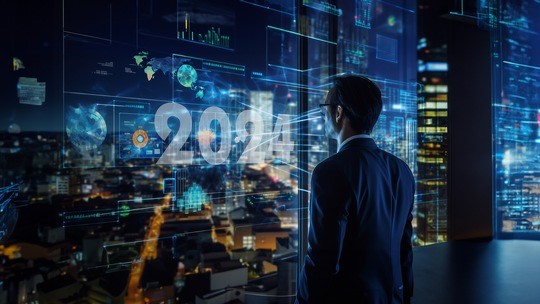Four trends for 2024: AI is gaining relevance for business success
Geopolitical and economic instability as well as the climate crisis are currently making it difficult for companies to plan for the medium and long term. Added to this is the ongoing pressure on productivity, which must be managed in the face of a worsening skills shortage. Daniel Fallmann, Managing Director of Mindbreeze, explains which technology trends organizations should have on their radar in 2024 to get through these uncertain times.

1. intelligent applications
Huge software suites that cover as many use cases as possible will soon be obsolete in their traditional form. Since the establishment of cloud services, many software manufacturers have been focusing on intelligent special applications. And rightly so, as the demand for smart tools is high due to the current shortage of skilled workers. Intelligent applications are highly specialized and based on AI technologies. In this way, they can automate certain activities, support decision-making, optimize processes and improve productivity. They are constantly learning and adapting to the context and intentions of their users. Ultimately, they help to significantly improve competitiveness.
Instead of continuing to work on large software flagships, companies are well advised to expand their existing products with external intelligent applications or to use these as the basis for new products. One example of this is the Mindbreeze Business Decision Insights (BDI) ecosystem. Manufacturers use the Mindbreeze InSpire insight engine as a starting point for developing their own solutions.
2. optimize large language models with retrieval augmentation
Retrieval Augmentation Generation, or RAG for short, offers the possibility of optimizing a Large Language Model (LLM) with specific information. This does not change the underlying language model - a major advantage, as training these models is very time-consuming and cost-intensive. In order for LLMs, such as GPT, to provide a company with reliable answers, they must be supplied with up-to-date and valid company data. With the help of insight engines and RAGs, LLMs are able to provide contextual and specific answers to internal queries more quickly. They can also avoid so-called hallucinations, i.e. answers from an AI that sound convincing but may be wrong.
3. sustainability will be directly linked to business success in the future
The importance of sustainability is now undisputed in the face of climate change and other environmental challenges. IT is no exception: whether it's reducing electricity consumption or recycling obsolete hardware, companies are increasingly recognizing that competitiveness and sustainability are inextricably linked. This is because they are increasingly required to present the impact of their business activities on the environment and society in an ESG report - for example when tendering for contracts.
Insight engines provide valuable services for maintaining an overview of ongoing sustainability initiatives in the coming year: they help companies to consolidate and process their growing volumes of data and derive recommendations for action from it.
4. clear legal framework for artificial intelligence
AI is here to stay - that's for sure. The European Union presented a corresponding regulation back in April 2021. The EU member states want to agree on a law, the EU AI Act, by the end of 2023. The world's first AI law is intended to guarantee that all AI systems used in the EU are safe, transparent, traceable, environmentally friendly and non-discriminatory.
In future, risk classes will regulate whether and under what conditions AI systems have access to the EU market. Manufacturers and potential buyers will have to take a close look at this topic in the coming year in order to plan their development steps and make future-proof purchasing decisions. Companies have up to 24 months after the AI Act comes into force to implement the law. Despite the existing uncertainties, companies will be able to make the right decisions in 2024 with the help of intelligent technologies - both at a strategic level and in the workplace.
Source: www.mindbreeze.com









